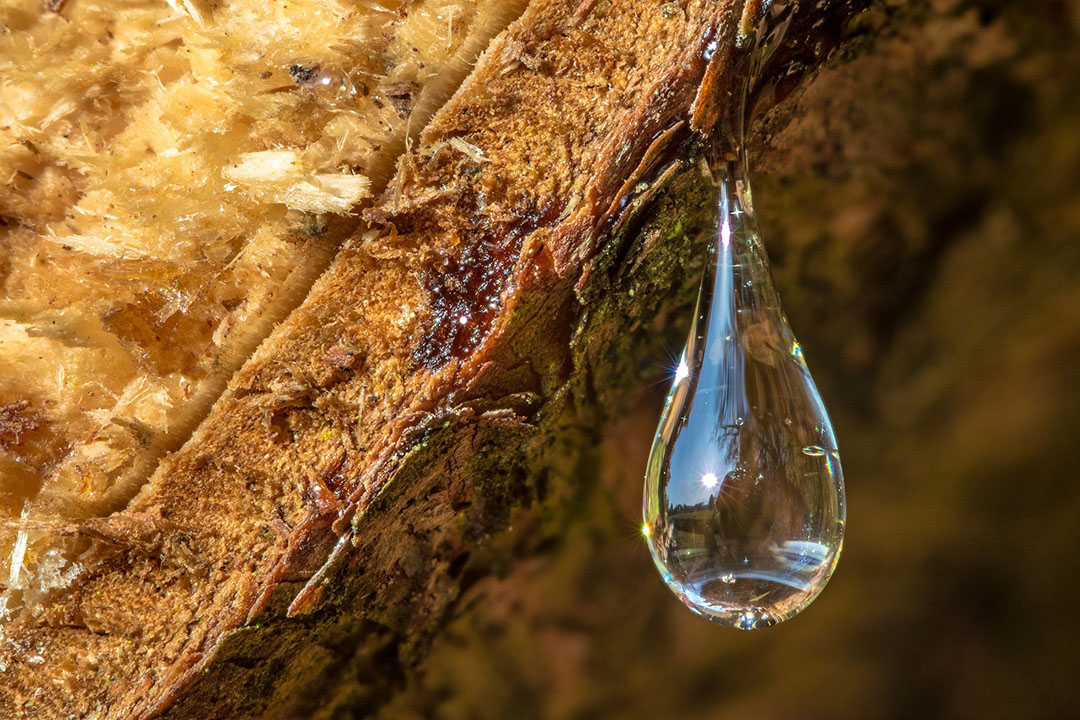New kid on the block: In-feed resin acids

Resin acids, obtained from trees have shown to be a powerful, natural tool to reduce antibiotic use and to promote growth and feed intake in livestock animals.
Northern coniferous forests contain the ingredient rosin. In Finnish folk medicine, rosin has been known for centuries for its anti-inflammatory and wound healing properties. Recent research has demonstrated that the active compounds of rosin are resin acids. Recent scientific research has confirmed the efficacy of these compounds, both in human clinical trials as well as in animal models and in vitro. This knowledge has spurred the Finnish company Hankkija Oy to investigate the potential of resin acids for animal feed further. As paper is made from wood, the Finnish company developed a technology based on harvesting the resin acids from a side stream of the paper industry. The mixture of resin acids is hence refined without chemical modification. In the pulping process of the paper industry, also called kraft pulping, wood is processed into cellulose pulp while hemicellulose, lignin and other extractives are removed. Fatty acids and resin acids of the trees, together called tall oil, are refined from a side stream of the pulping process by the Finnish company Forchem Ltd. Hankkija Ltd developed the resin acids product Progres® (hereafter called resin acid product) together with Forchem Ltd. Extracting resin acids from live trees to be used as a commercial product would not be practical, considering the volumes needed in the international feed business. By refining the natural resin acid molecules from the side stream of the paper industry, necessary volumes can be obtained without needing to harm live trees.
Trials in veal calves and pigs
Trials have shown that the resin acid product developed by the Finnish company supports the gastrointestinal integrity and function of animals. Resin acid improves both animal performance and the sustainability of animal production worldwide and is becoming an integral part of antibiotic free (ABF) production systems and at the same time improves the profitability of the industry. Resin acids are a new kid on the block, next to the feed additives that also show promise in promoting (gut) health in livestock animals and with that, reduce the need to use antibiotics. Feed additives that are used in animal diets include short and medium chain fatty acids, dietary fibres and probiotics. In addition, plant-derived phytochemicals have shown promising performance-enhancing effects as well as antimicrobial activities against pathogenic bacterial species. In studies in veal calves, the resin acid product was added at 0.1% in calf milk replacer (CMR). This was then compared with a plant extract product (control) in 2 trials. Trial 1 lasted 182 days and included 506 calves. They received restricted feeding of CMR and concentrate 1:1. Trial 2 lasted 183 days and included 562 calves. They received restricted feed of CMR and concentrate 1:1. The trials showed that resin acid improved the final slaughter weight and feed conversion of veal calves (Figure 1). Trials showed that the resin product improved the performance of sows and piglets (Hasan et al. 2018) (Figure 2). Each sow was given 5g of the resin acid product per day from one week before farrowing until the farrowing. It showed to have a beneficial effect on colostrum yield, colostrum IgG levels, the piglets’ colostrum intake, sow performance, litter performance and beneficial gut microbes.
Figure 1 – The resin acid product improved the final slaughter weight and feed conversion of veal calves (private research farm,The Netherlands).

Stronger gut epithelium in broilers
In the last years, resin-based products have been explored as feed components to improve and maintain intestinal health of broilers. Valkonen et al. (2018) showed that resin acids improved the growth and feed conversion in broilers. In a turkey trial, the product improved growth rate and FCR and reduced foot pad lesion scores (Lipinski et al. 2017). More recent research in broilers looked specifically at the gut health promoting effects of resin acids in the feed. Gut health can be defined in several ways, but a proper functioning gut epithelium is key. This is formed by collagen amongst others, a protein that gives strength to the gut epithelium, needed to withstand pathogenic bacteria, fungi, viruses, mycotoxins, heat stress, low-quality diet, or other stressors. Prolonged stress to gut epithelium leads to inflammatory processes, including increased production of specific enzymes which degrade collagen fibres: matrix metalloproteinases (MMPs). This in turn can lead to reduced nutrient uptake and other health problems. Given the anti-microbial and anti-inflammatory properties of resin, potential beneficial effects in the avian gut may be expected. And indeed, the newly published scientific article from the research group of professors Filip van Immerseel and Richard Ducatelle (Faculty of Veterinary Medicine of the University of Ghent, Belgium) demonstrated that inflammation-associated collagenolytic activity of MMPs, duodenal inflammatory T-cell abundance of the broiler gut was significantly suppressed by in-feed resin acids, while maintaining optimal gut morphology. The resin acid composition reduced collagen breakdown in the absorptive epithelium of broiler chicken and thus supports mucosal integrity against a variety of stressors. In this study, a mixture of natural resin acids from Scotch pine (Pinus sylvestris) and Norway spruce (Picea abies) was used. This pure resin acids product is a derivative of the commercial resin acid product, used in the pig and veal calves trials mentioned earlier in this article. For the purpose of the research at the University of Ghent, a purified fraction of resin acids was produced, in order to make sure that the observed effects were specifically caused by resin acids (and not the fatty acids that are also part of the commercial resin acid product). However, the recommended dosage of the commercial product is around 0.5 – 1.0 kg/ton of feed. Farm animal feeds typically contain much more linoleic and oleic acids than what comes from the resin acid product. Therefore, the beneficial effects of the commercial resin acid product are due to the resin acid fraction of the product.
Figure 2 – The resin acid product was given at 5 g/sow/day for the last seven days of pregnancy in three experiments (two in Finland, one in The Netherlands).

Minor effects on the microbiota composition
In the poultry trial, the Belgium researchers also looked at the bacterial composition in the gut and whether resin acids have an effect on this. The research team showed that administration of pure resin acids to broiler feed had only minor effects on the microbiota composition in the gut. Despite the known anti-microbial properties of resin acids extracted from coniferous trees dietary inclusion of resin acids had no effect on the microbial richness or diversity in either the ileum or caecum, nor did it alter the overall microbial community composition of the caecum. The composition of the ileal microbial structure did show differences between the resin acids-supplemented group and control birds, without affecting the composition of the caecal microbial structure. This is consistent with previous studies using either plant derived growth promoters or antimicrobial growth promoters, where the major microbial responses were observed in small intestinal compartments rather than in caecal or colorectal compartments. The researchers address that to confirm the presumably direct effects of resin acids on the propria mucosa homeostasis, further in vitro studies are required in absence of the host microbiota. The observation that resin acids have an effect on host intestinal inflammation and MMP activity provides a new direction for future research on the effects of resin acids on broiler intestinal health. In the coming years, Hankkija Ltd will continue do more research on the effects of resin acids on a variety of farm animal species, such as pigs, poultry, dairy cows, and calves.











